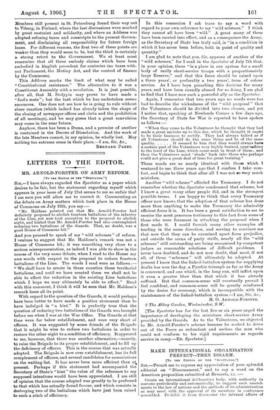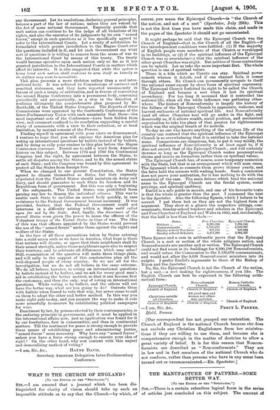MAKE INTERNATIONAL ORGANISATION
PERFECT—THEN DISARM. [To TEE EDITOR OP TRIG SP ECTATOR."] Sra,—Permit me to express my appreciation of your splendid editorial on "Disarmament," and to say a word on the American proposition submitted at Brussels, i.e. :- Create an international deliberative body, with authority to convene periodically and automatically, to suggest such amend- ments to the law of nations and the methods of its administration as may meet with the approval of its members in conference assembled. Prnhibit it from discussine the internal affairs of
any Government. Let its resolutions, declaring general principles, become a part of the law of nations, unless they are vetoed by the Act of some national Government. Expressly provide that each nation can continue to be the judge of all violations of its rights, and also the executor of its judgments by its own "armed forces," except in such questions as it has specifically agreed to refer to the International Courts. Let a treaty of arbitration be formulated which grants jurisdiction to the Hague Court over
the questions included in it, and let each Government say what
sort of questions it is willing to remove from the arena of war to the International Court by means of this treaty. The treaty would become operative upon each nation only so far as it has granted jurisdiction to the International Courts in matters which affect its interests. It is also suggested that while this system is being tried each nation shall continue to arm itself as heavily as its welfare may seem to necessitate.
This plan presents a mere skeleton rather than a real inter- national body. It was referred to Commissions of eminent and practical statesmen, and they have reported unanimously in
favour of such a treaty of arbitration, and in favour of converting the second Hague Conference into a permanent body, convening
periodically and automatically, as a step in the direction of realising ultimately the comprehensive plan proposed by Mr. Bartholdt, of the United States Congress. The Reports of these Commissions were approved by the fourteenth Conference of the Inter-Parliamentary Union with such unanimity that these—the most important acts of the Conference—have been hidden from view, and comment confined to its resolution suggesting a careful study of armaments with a view to their reduction, or at least limitation, by mutual consent of the Powers.
Finding myself in agreement with your views on disarmament, I venture to hope that you will espouse the American plan for voting on international questions by ballots instead of by bullets, and by doing so rally your readers to this plan before the Hague Conference convenes. Permit sue to add a word from American history on this subject. Between 1776 and 1789 the Continental Congress had the right, by agreement between the States, to settle all disputes among the States, and to fix the armed status of each State; and the Congress was bound by this agreement to protect all the States from foreign foes.
When we changed to our present Constitution, the States agreed to disarm themselves as States, but they expressly stipulated that the United States should maintain an Army and Navy, and should guarantee to each State its freedom and its Republican form of government. But this was only a beginning of the safeguards. The United States was prohibited from passing any law to disarm the individual citizens. This was to enable each State to mobilise an armed body quickly, in case resistance to the Federal Government became necessary. It was
provided further, that the Federal Government could not intervene in a difficulty arising within a State until called
upon for aid by the State. And, finally, the Governors of the several States were given the power to name the officers of the Volunteer troops of the United States in time of war. The idea of this was that officers appointed by the States would prevent the use of the "armed forces" under them against the rights and welfare of the States.
In the face of all these precautions taken by States entering into a solid union such as we have in America, what hope is there that nations will disarm, or agree that their neighbours shall fix their armed strength, unless those neighbours agree also to respect their territory, and to arbitrate all differences which may arise ? Still, examination of the question will make these things plain, and will rally to the support of this constructive plan all the well-disposed people of every country. So we are all for the investigation, but we do not all believe in the same outcome. We do all believe, however, in voting on international questions by ballots instead of by bullets, and we ask for every good man's aid in establishing the better method, so that it can become first the customary, and then the only, way of voting on international questions. While voting is by bullets, and the others will not have the better way, what are you going to do? Outvote them with bullets when forced to vote that way, but never cease to call on them to adopt the other and better method. In this way you make right rule to-day, and you prepare the way to make it rule more peacefully to-morrow by substituting political campaigns for wars.
Enactment bylaw, by persons elected by their contemporaries, is the enduring principle in government, and it must be applied in the international affairs now, just as application was found for it by our forefathers, first in communities, and then in continental matters. Till the sentiment for peere is strong enough to provide these means of establishing peace and administering justice, "armed forces" seem necessary. Why have any "armed forces" unless you have a force strong enough to execute your idea of right ? On the other hand, why rest content with this unjust and demoralising method of voting ?
Secretary American Delegation Inter-Parliamentary Conference.







































 Previous page
Previous page